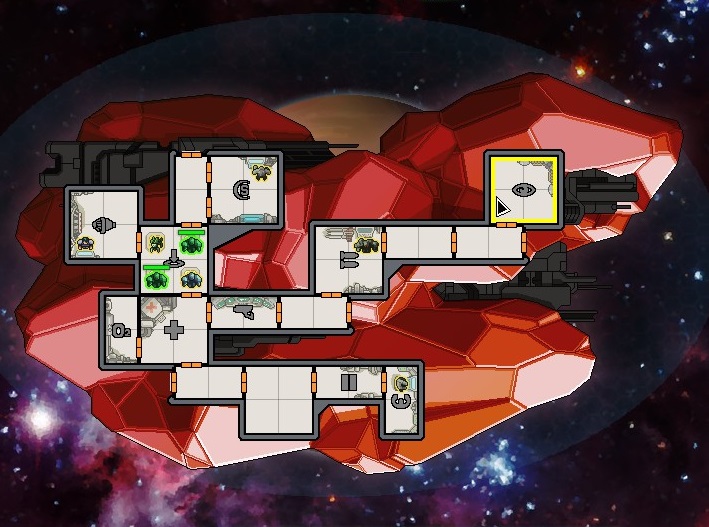 Review by Matt S.
Review by Matt S.
I was so very close to succeeding, and I thought I was going so well. There I was, a space ship fleeing through the vast reaches of the universe with vital intel on a hostile rebel fleet. I was keeping just the one step ahead of the pursuing fleet as I jumped from region to region gathering loot, improving the capabilities of my ship and inching ever closer to the Federation home base.
I had a crew of a half dozen scattered survivors; a rag tag band of desperate individuals from a range of different alien species. I had drones patrolling around my ship protecting it from incoming missile fire. We’d survived dozens of encounters with hostile AI, pirates, and hulking alien ships. And then, with the goal in sight, we ran into a whopping huge rebel fighter in the middle of an asteroid field.
Pummelled by rocks, my shields had no chance to also hold up against this ships advanced weaponry. Some shots landed home. Fires broke out in my hull. A raiding party from the enemy invaded my ship and killed off some of my crew, as the others desperately fought off the flames.
Despite the damage done to my hull, I managed to get some shots home of my own, and the rebel ship broke apart. I got my shields back up in working order, sent the remaining crew to the med room to recover, and got my helper robot to conduct emergency repairs on the ship. Just two jumps away I could see a galactic shop that would repair the rest of the damage and hopefully set me on the straight home. I made the first FTL jump… and ran straight into a battle cruiser.
In seconds my ship was destroyed and my score logged on the leaderboard. Back I went to the start of the game to try again. That is FTL in a nutshell.
In essence FTL is a roguelike set in space. Rather than earning experience points and levelling up a single character as you would in a standard roguelike, however, players earn scraps from defeating enemy ships and occasionally getting lucky and finding it lying around, and use that scrap to purchase better weapons, more powerful shields, and recruit more crew members to the ship.
The goal is simple; move from one end of the universe to the other, by “jumping” between regions in space. If you’ve seen Battlestar Galactica you know how it works. If you’ve played Mass Effect, then you also know how it works. If you’ve experienced neither, then FTL probably isn’t for you since you clearly don’t appreciate good sci-fi. Each new region that you jump to will bring either conflict with another ship, or, occasionally, a shop to buy new goods at or a random event that allows players to choose between conflict or a more peaceful resolution. The problem is that players are fleeing a hostile force, and the longer they take in a region the closer that hostile force comes. If it catches up, then it’s essentially game over.
FTL involves a lot of balancing and decision making; do you spend precious time visiting a shop, or do you press on looking for more scrap by exploring an unknown region? Do you upgrade shields, find better weapons, or build new facilities in your ship, such as a backup battery or a cloaking device? There is never enough resources on hand to do everything that you’ll want to, and it’s in making those compromises that are what makes FTL a fascinating experience.
Get to the very end and you’ll face a showdown with a very powerful enemy ship indeed. Being able to beat that ship requires careful planning from the very start of the game, and while those early areas might seem relatively easy, it’s the decisions that you make there that will determine just how prepared you will be at the end as you face off against the “boss.”
Roguelikes are never easy, and FTL is no different. The scenario I described at the start of this review was on the easiest difficulty setting which, four dozen tries later, I have succeeded at only once. I’ve yet to “win” on normal or hard difficulty. And yet I persevere; firstly to see if I can beat my previous high score, and secondly, to unlock all the extra stuff that the game offers. There are an incredible range of different ships to unlock from the one that you’ll start with. Each offers a fundamentally different way to play, with different weapons and strategies from the outset. And because planet layouts and events are randomised in the game, every single play through is a different experience. The random nature means that sometimes it’s unfair and you’ll come up against a near-impossible enemy almost immediately. But that’s FTL. In space no one can hear you scream and all that.
This game plays so perfectly on iPad that it’s like it was developed with that platform in mind from the outset. The interface is clean and functional and after a tutorial that lasts not more than 10 minutes, you’ve got all the information you need to have a fighting chance. Combat is real time, but the ability to pause at any time and issue commands means it’s a highly strategic kind of real time action. The visual aesthetic is retro, the music is precisely what you’d expect from a tense space game. On the retina screen of the iPad, it simply looks and feels perfect.
What FTL boils down to is a brutally difficult and very rewarding roguelike and it is one of the finest examples of the genre. It’s not for the easily frustrated, especially considering how easily iPads shatter when thrown at walls, but this here is as much proof as you’ll ever need that the decides are capable of providing a gaming experience every bit as on par as anything you’ll get on any console or PC.
– Matt S.
Editor-in-Chief
Find me on Twitter: @digitallydownld








